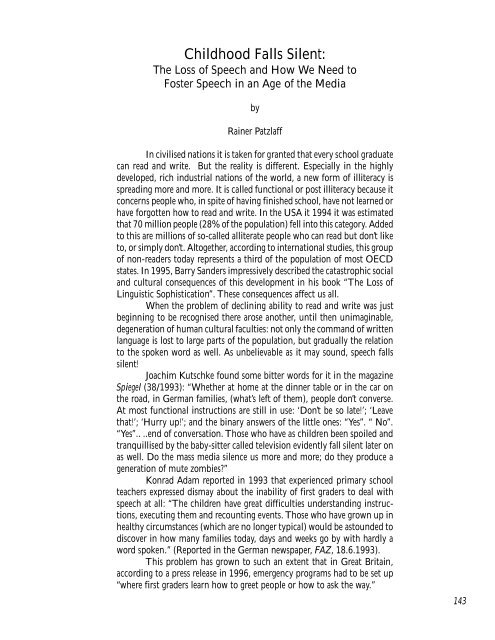Colloquium on English - Research Institute for Waldorf Education
Colloquium on English - Research Institute for Waldorf Education
Colloquium on English - Research Institute for Waldorf Education
Create successful ePaper yourself
Turn your PDF publications into a flip-book with our unique Google optimized e-Paper software.
Childhood Falls Silent:<br />
The Loss of Speech and How We Need to<br />
Foster Speech in an Age of the Media<br />
by<br />
Rainer Patzlaff<br />
In civilised nati<strong>on</strong>s it is taken <strong>for</strong> granted that every school graduate<br />
can read and write. But the reality is different. Especially in the highly<br />
developed, rich industrial nati<strong>on</strong>s of the world, a new <strong>for</strong>m of illiteracy is<br />
spreading more and more. It is called functi<strong>on</strong>al or post illiteracy because it<br />
c<strong>on</strong>cerns people who, in spite of having finished school, have not learned or<br />
have <strong>for</strong>gotten how to read and write. In the USA it 1994 it was estimated<br />
that 70 milli<strong>on</strong> people (28% of the populati<strong>on</strong>) fell into this category. Added<br />
to this are milli<strong>on</strong>s of so-called alliterate people who can read but d<strong>on</strong>’t like<br />
to, or simply d<strong>on</strong>’t. Altogether, according to internati<strong>on</strong>al studies, this group<br />
of n<strong>on</strong>-readers today represents a third of the populati<strong>on</strong> of most OECD<br />
states. In 1995, Barry Sanders impressively described the catastrophic social<br />
and cultural c<strong>on</strong>sequences of this development in his book “The Loss of<br />
Linguistic Sophisticati<strong>on</strong>”. These c<strong>on</strong>sequences affect us all.<br />
When the problem of declining ability to read and write was just<br />
beginning to be recognised there arose another, until then unimaginable,<br />
degenerati<strong>on</strong> of human cultural faculties: not <strong>on</strong>ly the command of written<br />
language is lost to large parts of the populati<strong>on</strong>, but gradually the relati<strong>on</strong><br />
to the spoken word as well. As unbelievable as it may sound, speech falls<br />
silent!<br />
Joachim Kutschke found some bitter words <strong>for</strong> it in the magazine<br />
Spiegel (38/1993): “Whether at home at the dinner table or in the car <strong>on</strong><br />
the road, in German families, (what’s left of them), people d<strong>on</strong>’t c<strong>on</strong>verse.<br />
At most functi<strong>on</strong>al instructi<strong>on</strong>s are still in use: ‘D<strong>on</strong>’t be so late!’; ‘Leave<br />
that!’; ‘Hurry up!’; and the binary answers of the little <strong>on</strong>es: “Yes”. “ No”.<br />
“Yes”.. ..end of c<strong>on</strong>versati<strong>on</strong>. Those who have as children been spoiled and<br />
tranquillised by the baby-sitter called televisi<strong>on</strong> evidently fall silent later <strong>on</strong><br />
as well. Do the mass media silence us more and more; do they produce a<br />
generati<strong>on</strong> of mute zombies?”<br />
K<strong>on</strong>rad Adam reported in 1993 that experienced primary school<br />
teachers expressed dismay about the inability of first graders to deal with<br />
speech at all: “The children have great difficulties understanding instructi<strong>on</strong>s,<br />
executing them and recounting events. Those who have grown up in<br />
healthy circumstances (which are no l<strong>on</strong>ger typical) would be astounded to<br />
discover in how many families today, days and weeks go by with hardly a<br />
word spoken.” (Reported in the German newspaper, FAZ, 18.6.1993).<br />
This problem has grown to such an extent that in Great Britain,<br />
according to a press release in 1996, emergency programs had to be set up<br />
“where first graders learn how to greet people or how to ask the way.”<br />
143

















